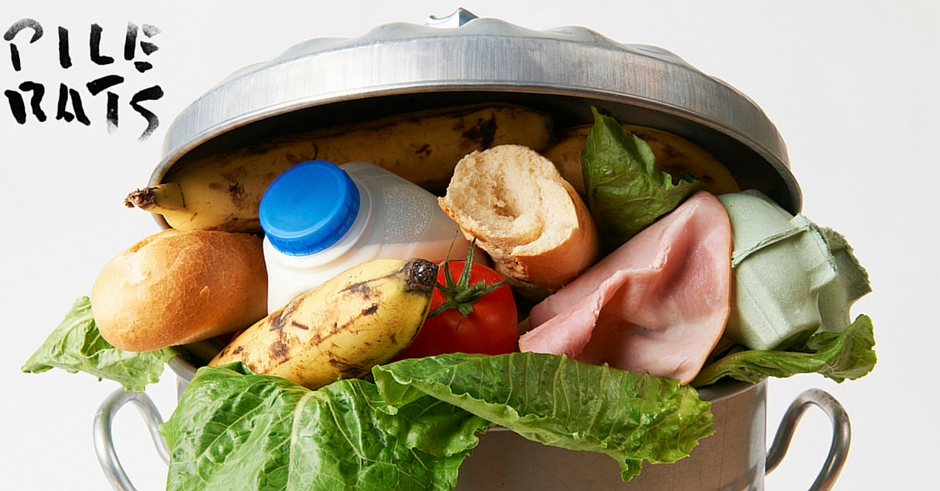 A Moon Shaped Pool: A (very) in-depth look at Radiohead's new albumA very in-depth look at Radiohead's new album from a very in-deep fan.
A Moon Shaped Pool: A (very) in-depth look at Radiohead's new albumA very in-depth look at Radiohead's new album from a very in-deep fan.

A handy guide on lessening your food waste impact
Australians waste more food than any other nation - here’s some tips about how we can change this.
Isn’t there a saying along the lines of “you can tell a lot about someone from their rubbish” or something like that? Maybe I just made that up, but I think it’s pretty true. And if we as Australians were to look into our own bins, we might be surprised by what we see.
In the last year, I’ve started to bin dive for food more and more frequently. Apart from it being a great money saver, it also takes out the crippling anxiety associated with trying to decide which of the 57 different types of natural yoghurt I want to eat. It’s scary enough to look into your own household bin and see the quantities food that have been thrown away, but when you start lifting up the lids on commercial waste what you tend to find is nothing short of horrifying.
For example, last night we went into a bin of a fresh food grocer just around the corner from my house. Within 30 seconds of rummaging, we stumbled across about thirty avocados – all still edible. Now I don’t know about you, but to me avocados seem to be worth more than gold, sometimes going for up to $4 a pop. Effectively, we’d just stumbled across about $100 worth of avos. 20 minutes later and we walked off into the night with cardboard boxes laden with juicy tomatoes, crispy capsicums, bananas, fresh yoghurt (within use-by date), raspberries, potatoes, onions and more. And that was from one day, in one particular suburb in this massive country of ours.
Foodwise claims that up to 40% of the average household bin is comprised of food – equating to just over $1K worth of food being chucked out annually. Aggregated to a national scale – we as Australians discard around $8 billion worth of food every year – equating to four million tonnes (or 450,000 garbage trucks, give or take a few). On a global scale, estimates suggest around one third of food produced for human consumption is wasted – approximately 1.3 billion tonnes. Alarmingly, consumers in developed countries waste almost as much food (222 million tonnes) as the entire net food production in Sub-Saharan Africa (230 million tonnes).
Heading further along the production line, it is estimated that between 20 to 40 percent of fruit and veg is rejected before it even reaches the shops – owing mainly to our incredibly high standards of the appearance of food. And to this I can relate. While I’m happy to delve through a giant plastic box for food that has been discarded, on occasions where I am actually in this same grocer buying food, my personal expectations and standards for the appearance of fresh produce are outrageously high. I only have to think about how much time I spend lifting up pieces of fruit and checking for any imperfections to realise how ingrained this is in my buying habits.
The statistic that surprised me though, was that young consumers aged 18-24 are one of the most guilty parties in terms of food wastage (along with families with children and households with incomes in excess of $100,000). Maybe its because we’re so hungover on Sunday that cheap takeaway seems much easier to fathom than actually having the strength to stand over a stove, or that we’re prioritising disco biscuits over food while everything rots away in the fridge? Either way, we’ve gotta work on it.
So there’s our problem. We as a nation are wasting incomprehensible amounts of perfectly edible (and delicious) food. Now, what should we actually do about this? Here’s five suggestions:
PLANNING IS YOUR FRIEND
Yeah sure, a lot of us lead increasingly busy lives. Between uni and work and party time we might not give much thought to our eating habits. It’s worth taking five minutes out of your day at the start of the week to consider what food you still have – what needs to be used now and what still has a few days of life left. I generally find that shopping on a daily basis, or every two days definitely helps reduce the amount of waste I create as it reminds me to maintain some sort of mental inventory on what’s in the cupboard or fridge at home.
FREEZE, FREEZE, FREEZE!
We as 21st century humans have been gifted with the undeniable ingenuity of freezers! We don’t have to stick everything in jars of salt (or live in the Arctic circle) in order to preserve food that’s heading towards the end of its golden days. Freezing fruit is epic for smoothies, and meat can easily be preserved for 2-3 months.
TELL MALCOLM TO KEEP WOOLIES AND COLES IN LINE
This is something we need to heckle the pollies about. Send old Malcolm a letter (or ten) suggesting we should follow in the footsteps of countries like France – who last year introduced legislation preventing supermarkets from throwing away or destroying unsold food, instead donating it to charities or for use as animal feed. Coles and Woolies are not entirely at fault as they are catering to consumer expectation, but the fact of the matter is that this food should not be getting chucked into landfill.
COMPOSTING
Yes, a lot of us live in the cities where composting is unrealistic. I wouldn’t want a massive compost bin or worm farm in the lounge room of my small inner city apartment either. But maybe you have a friend who does have a backyard and a composting system? Try and work out a system where you can transport your food scraps to their compost bin – and maybe in return you can request some of those fresh tomatoes growing out the back as your food scraps are giving them all the nutrients to make them as juicy as they look.
GETTING CREATIVE IN THE KITCHEN
Yeah. So maybe you didn’t need 10 bananas in the end. Those five in the fruit bowl are looking pretty sorry aren’t they. Why not make a whole batch of banana bread? All that spinach is looking a little wilted, so why don’t you make a big spanakopita to impress your housemates? I like to think of it as a sort of challenge – a test of my creative ability by seeing what I can do with my leftovers or food that needs to be used. Yep – I concede there will be days when that creativity may not pay off, but at least you can take solace in the fact you didn’t chuck all that stuff out (right?).
-
We as a nation need to think more about how we consume food. With an ever increasing population, and the onset of global warming, our ability to grow food is already being irreversibly altered. You’ll save yourself some serious coin, and soon all your mates will be impressed by your ability to turn mundane ingredients into a mouth-watering dish they’ll all be wanting more of.

Hectic cool infographic below by Foodwise.
 A Moon Shaped Pool: A (very) in-depth look at Radiohead's new albumA very in-depth look at Radiohead's new album from a very in-deep fan.
A Moon Shaped Pool: A (very) in-depth look at Radiohead's new albumA very in-depth look at Radiohead's new album from a very in-deep fan.
 Five Minutes with MOSSYWe spoke to I OH YOU rising star Mossy about acting with Geoffrey Rush and being honest.
Five Minutes with MOSSYWe spoke to I OH YOU rising star Mossy about acting with Geoffrey Rush and being honest.